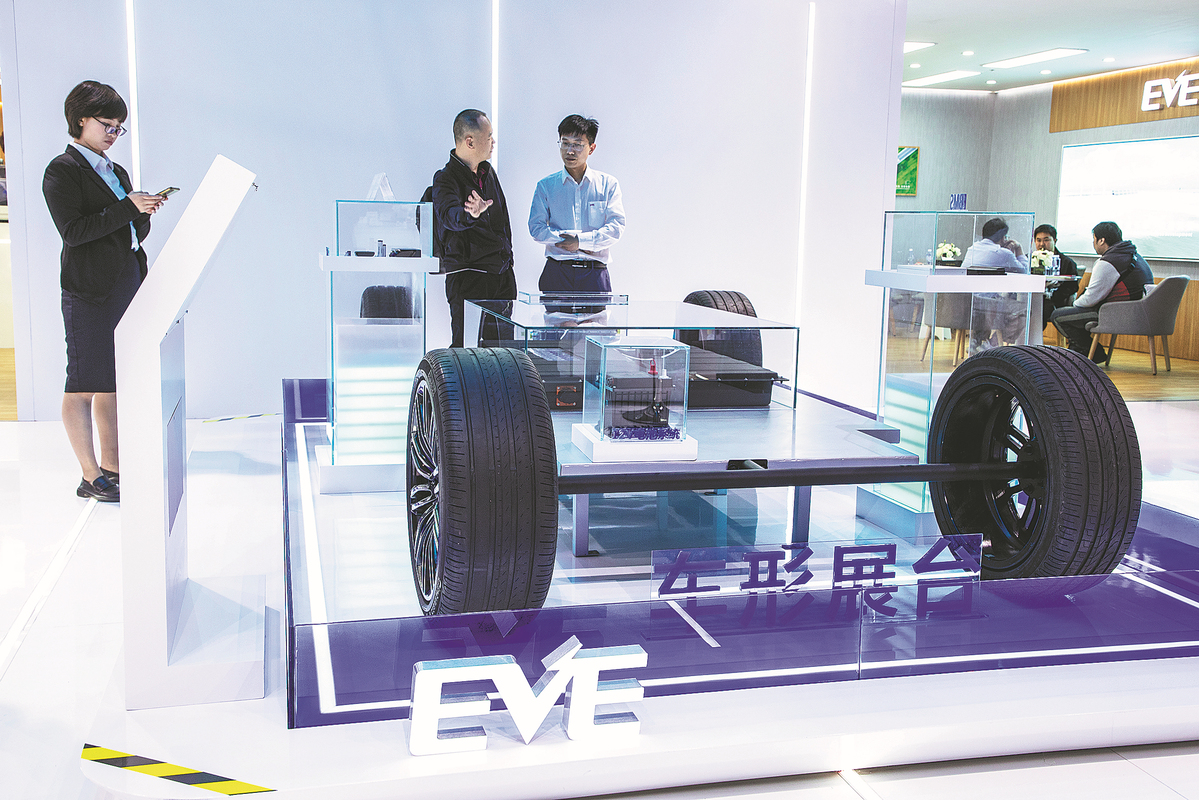BYD ADAS for mass market brand to appear on Han first, will be a Q3 thing
You are using an out of date browser. It may not display this or other websites correctly.
You should upgrade or use an alternative browser.
You should upgrade or use an alternative browser.
New Energy Vehicles (NEVs) in China
- Thread starter supercat
- Start date
EVE Energy to set up EV battery unit in Hungary
By LIU YUKUN | CHINA DAILY | Updated: 2023-05-11 07:28

EVE Energy Co Ltd, a Chinese battery manufacturer, plans to invest about $1.18 billion to build a battery plant in Debrecen, Hungary, to supply German carmaker BMW's plant in the country.
The planned Debrecen plant, experts said, will mark the latest foray by Chinese battery makers into overseas markets, and show that they are supported by expanding production capacity, advancing technologies and improving services, which also help them secure a significant market share worldwide.
Contemporary Amperex Technology Co Ltd, the world's largest electric vehicle battery maker, announced last year it will invest 7.34 billion euros ($8.04 billion) to build a battery production unit with a capacity of 100 gigawatt-hours in Debrecen to supply European automakers.
EVE Energy, the world's ninth largest battery cell manufacturer by installed capacity, said in a statement on Tuesday it had signed an agreement to buy a 45-hectare tract of land in Debrecen's northwest industrial zone for the production of cylindrical batteries.
EVE Energy will invest around 400 billion Hungarian forints ($1.18 billion) in the project, and Hungary's government will support the project with 14 billion forints, reported Xinhua News Agency, citing Peter Szijjarto, Hungary's minister of foreign affairs and trade, on Tuesday.
The move is to meet the demand for new-generation cylindrical batteries from German carmaker BMW's plant in Hungary, Xinhua said.
Buoyed by growing demand for electric vehicle batteries, an increasing number of Chinese battery makers are expanding their global footprint.
Data from China Business Journal showed a batch of battery makers — CATL, Sunwoda Electronic Co Ltd and EVE Energy — have reportedly established overseas factories with accumulated finished investment of $2.3 billion in the first 11 months of last year.
Zhou Mi, a senior researcher at the Chinese Academy of International Trade and Economic Cooperation in Beijing, attributed the significant increase in China's lithium battery producers' expansion into foreign markets to several factors like an increase in production capacity and technological advancements in lithium battery manufacturing.
"Chinese battery makers have distinct benefits in collaborating with related equipment manufacturers in both the upstream and downstream supply chain segments. They also enjoy an advantage in pricing due to their enhanced production capacity and volume, which also enables them to provide sustainable supply," Zhou said.
According to data released by South Korean battery market research firm SNE Research, in the first quarter, carmaker BYD's battery installation surpassed South Korea's LG Energy Solution and ranked second with a 16.2 percent market share worldwide.
In the same period, BYD's battery installation volume hit 21.5 GWh, a 115 percent increase from last year's 10 GWh.
CATL's market share was the highest at 35 percent, and its first-quarter battery installation was 46.6 GWh, a 35.9 percent year-on-year increase from last year's 34.3 GWh. The combined market share of these two companies exceeds 50 percent worldwide, SNE Research said.
"The growing demand for renewable energy and new energy vehicles from major consumer countries has also played a role," Zhou said.
Chinese companies, he said, have an edge over their competitors in terms of production scale, efficiency and service, which allow them to supply large quantities of lithium batteries that meet diverse customer needs.
more hydrogen powered bus delivered. it will be interesting to see what kind of breakdown we get between hydrogen and battery for longer ranged buses
BYD displaying its whole range of forklifts at LogiMAT 2023
now an update on prices for japanese cars. The price cuts weren't as aggressive as I thought they would be, but the sales from Nissan & Honda dropped so much in Q1.
Another hit from HW前HR.和中国工程师们的战争败了:德国大众软件公司高管成为电车落后的第一波牺牲品,慢吞吞的欧美作风在中国大卷王面前已经不合时宜,后续他们还要领教市场被打得丢盔弃甲的代价。
日前,德国大众公司对大众集团软件子公司CARIAD高管进行清洗,CARIAD现任首席执行官Dirk Hilgenberg、首席技术官Lynn Longo以及首席财务官Thomas Sedran都将被解职。这里面媒体说有派系内斗原因,但是最关键是CARIAD误事,严重拖累了大众的转型。其负责的E3架构(端到端电子电器架构,由End-to-End Electronic Architecture)进度严重落后,导致想用高端电动汽车平台的奥迪Q6 e-tron和保时捷电动版Macan车型迟迟无法开启量产,严重影响业绩。
实际上,德国大众是欧美日传统车厂落后的一个影子。主要是电动化慢,人才培养难和慢,欧洲日本都缺乏这类人才。比如CARIAD元计划要招募超过一万名软件专业人才,但实际现在才6000人,落后很多年都没有完成。欧洲根本就没有这种人才,你看整个移动互联网除了中国和美国,其他地方有声音吗?可德国人却只在中国招900人,要是在中国搞个5000人,啥系统都搞好了。德国人做事慢吞吞,这些软件不是什么颠覆性大创新,更多是软件应用设计与开发,靠的是堆工程师和项目经理,可是德国人在工程师战争中败了。
电动化慢,欧洲日本车的智能化就更慢了。比如你去看这些欧美日韩车机,比中国企业车机落后一大截,在智能化方面完全不行。比如问界的智慧语音简直指哪打哪,而另外几个国家车企的车机简直是和弱智在对话或者干脆不支持智慧语音。至于他们的自动驾驶不要说和问界的ADS2.0比,就是和国内一些新势力比较也是垃圾玩意。所以用过这些优秀国产车车机后再用他们的,简直像回到油车时代的车机一样。
Can't really disagree with this. German automaker are incapable of moving faster in going NEV or going AV. The software development is just not up to par
Not too surprising as I'm pretty sure Montreal exclusively uses Nova Bus. I'm curious how the electric versions will fair in the Quebec winters.Canadian province paying $1.1 BILLION dollars (Doctor Evil finger to mouth) for 1,229 electric buses from Geely subsidiary
broadsword
Brigadier
Canadian province paying $1.1 BILLION dollars (Doctor Evil finger to mouth) for 1,229 electric buses from Geely subsidiary
Nova ebus range of 470 km before needing a charge compares favorably with BYD's 250km.
